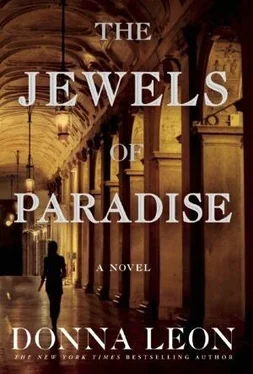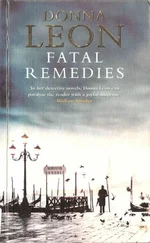Sergio picked up his glass, looked at it, then put it back on the counter.
In a voice he made sound calm, he said, “I took out twenty euros and I set them on the newspaper. Beside the wing. And I told him that nothing was going to happen to him and that he could believe me.”
“And?”
“And then I left the shop and went home.”
“Did you tell Clara?”
“No. I wanted to talk to you first.”
“Good. Thank you,” Caterina said, then, “How does this make you feel?”
“Like a shit. I’ve never bullied anyone in my life,” Sergio said, then knowing how impossible to believe that would be for anyone who saw him, he added, “Not since I was a kid, that is.” He raised his hands inward and drew them repeatedly up and down in front of his body. “I can’t very well do that, can I?”
“So it’s a handicap?” Caterina asked, stunned by her own question.
“What?”
“Being so big. It’s a handicap?”
Sergio smiled, as if the question had suddenly set him free from something. “I never thought of it that way,” he said, voice filled with new surmise. He took another handful of peanuts and put them all into his mouth. He chewed them for a while, washed them down with the rest of the wine. He turned and signaled to the waiter, gave her an inquisitive look, but Caterina shook away the possibility of a second glass.
The waiter was quickly back with another glass of wine. Perhaps, having come close to Sergio’s outstretched hand, he didn’t want to keep this client waiting.
Sergio took the glass and waved it in Caterina’s direction. “What should I do about Clara?”
“You mean about telling her?”
Sergio nodded.
“You tell her everything, don’t you?”
He nodded again.
“Then you better tell her.”
“I thought so, too.”
“But tell her you were doing it for me.”
“You think that will change anything?” he asked. Sergio, she knew from long experience, could be as hard on himself as she was capable of being when judging her own excesses.
“You were helping someone in the family. If she wants to get angry, she can get angry with me.”
“Wouldn’t be the first time, would it?” he asked, then smiled. Caterina reached for some peanuts and thought about having a second glass of wine.
ALTHOUGH SERGIO INVITED HER BACK TO DINNER, CATERINA was reluctant to go as far as San Polo. How easily the habits of the city returned, making her hesitant to leave her own sestiere , viewing an invitation to San Polo or Santa Croce as little different from a forced expedition to the Himalayas. What would happen if she had to cross Il Ponte della Libertà toward terraferma ? Take her passport? Refuse to go because of her fear of strange food and exotic diseases?
She managed to shake off these musings and persuaded Sergio that it would be easier to explain things to Clara if she were not present.
When they left the café, he said he’d walk home, which meant he’d head back toward the Accademia. He kissed her on both cheeks, told her to call him again if she needed him, and headed off to his home and his family.
Caterina walked out to the water, noticed that the daylight was swiftly disappearing, and started along the riva , heading home. What a pair of failures they were. At the first sign of weakness, both she and Sergio capitulated. In her case, her dislike of confrontation was the result of size, not principle.
By the time Caterina was in university, Mina had long been a myth, and her discs could still astonish. How Caterina loved the cover of one of the old discs—it must be from three decades ago—with her head seamlessly airbrushed onto the body of a bodybuilder. A woman’s head—and brain—on top of a hundred kilos of muscle and power; if Caterina had that body, she’d once believed, she’d be the head of the music department at the University of Vienna. Hell, she’d have been head of state.
But now, having learned that size and power could be a handicap, at least for a person as decent as Sergio, she had to dismiss even that illusion. The man had followed her because he was afraid of his father, and his fear now made him untouchable by her or Sergio. “ Mamma mia, ” she whispered.
When she got to the apartment she spent another two hours hunting for Abbé Montalbano, chasing him through scholarly books and journals in four languages, seeking some sign of his passing in the catalogues listing the hundreds of thousands of books now available online, even though she knew he was unlikely to appear. She searched for him in historical journals and musicological theses, in the diplomatic files of minor principalities and the memoirs of forgotten noblemen and women.
Occasionally she caught a fleeting glimpse of him. In 1680 he accompanied Friedrich August, the son of Ernst August, as tutor on a trip to Venice and Rome. A letter from a composer for whom he wrote libretti referred to him as an intensely religious man, though in a “superstitious way.” Montalbano was believed to be Venetian, though she found no record of his birth in the city archives. He hung around the court in Hanover for years, always ready, it seemed, to help Ernst August with the embarrassing affairs of his family. Little was written about his salary until he was paid, and royally—Caterina smiled as that word came to her—the 150,000 thalers that came to him in the year of Königsmarck’s death, though some sources cut it to just 10,000. The only subsequent references to him that Caterina found appeared in a biography of Leibniz, where he was said to have returned to his native country and become the archdeacon of Mantova, where he died in 1695, and a reference to the account books of the court of Hanover, in which was noted a pension paid to the “mistress of the Abbé Montalbano” for forty-seven years after his death. The money that was given to him, whatever its true quantity, might as well have evaporated for all that was ever known of it.
She switched files and found the words of Countess von Platen: it was the abbé “who gained from the fatal blow that sent him to his maker . . . Did he not, Judas-like, make possible and profit from the crime? The blood money given to him bought the Jewels of Paradise, but nothing can buy him manhood and honor and beauty.”
“Pronoun reference, you fool,” she said out loud. Change the meaning of “he” from Abbé Steffani to Abbé Montalbano, and the picture of Steffani changed focus. He ceased to be an assassin; he ceased to have been involved in a murder to curry political favor for himself or his religion. He went back to being a fine composer and a man busy to advance the interests of his church and family. “Nothing can buy him manhood . . .” If this was not a reference to Steffani, then the writer was using “manhood” as a synecdoche for all the manly virtues absent from a man like Montalbano and not for missing body parts.
The “Jewels of Paradise,” however, remained a mystery to her. What did Montalbano buy with his blood money and what became of it at his death?
Hunger reminded her that it was time to stop asking these questions and think of finding something to eat. She cut some courgette and put them on to sauté, cut some tomatoes and added them, set it to simmer. The realization crashed upon her that, in all this time, she had not done the obvious thing and listened to Steffani’s music. She had read through it, sung through it in a soft voice, hummed a good deal of it. But she had not heard it in any real sense. She went over to the computer and found YouTube, typed in his name, and then selected Niobe, the work with which she was most familiar.
She turned down the flame under the vegetables and went back to the dining area and, glancing out this window, saw that the Bears were visible, having dinner. She switched off the light and moved back from the window, where she thought they would not see her, and studied the family. Niobe was the mother of fourteen children, and her boasting of their perfections had brought upon her the wrath of the gods, who slaughtered them all. The Bears had only two, both seated at the table with them.
Читать дальше












